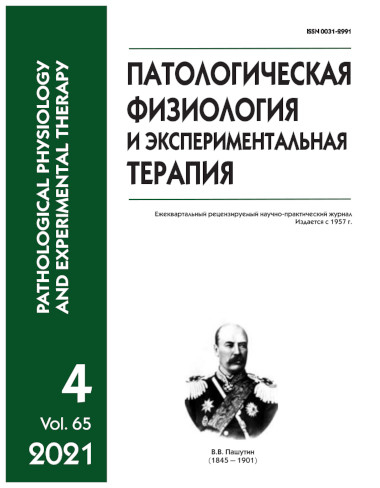The severity of the acute phase response in experimental ulcerative colitis under conditions of the use of vitamin D3 in the original rectal suppositories
DOI:
https://doi.org/10.25557/0031-2991.2021.04.80-88Keywords:
ulcerative colitis, vitamin D3, acute phase response, IL-8, IL-6, TNF-α, C-reactive protein.Abstract
<p align="justify"><strong>Aim</strong><strong>.</strong> To study the effect of vitamin D3 in rectal suppositories on severity of the acute phase response (APR) in experimental ulcerative colitis (UC). <strong>Methods.</strong> Experiments were performed on 49 mature male Wistar rats. UC was induced by cutaneous followed by rectal applications of a 3% oxazolone alcohol solution. Novel polyethylene glycol suppositories (300 mg) containing 1500 IU of vitamin D3 were injected <em>per rectum</em> every 12 hrs for 6 days. Data were collected on days 2, 4, and 6 of UC. The clinical picture was assessed according to the Disease Activity Index (DAI) scale adapted for rats, taking into account body weight, consistency of, and the presence of blood in the feces. The number of blood leukocytes and neutrophils was determined on a hematological analyzer and in blood smears. The functional activity of neutrophils isolated from the blood was evaluated by the absorption of monodisperse latex particles and with the spontaneous and induced NBT test. Serum concentrations of C-reactive protein (CRP), IL-6 and IL-8 were measured by enzyme immunoassay. TNF-α expression in the colon wall was measured by an immunohistochemical method. <strong>Results. </strong>The following changes in APR variables along with a progressive increase in DAI were recorded on days 2, 4, and 6. Expression of colon TNF-α increased, with maximal values on days 4 and 6. Serum IL-6 increased and reached a maximal value on day 4; and serum IL-8 increased, with a maximum on day 6. Serum CRP increased, with a maximum on day 6. The total number of blood leukocytes and the number of stab and segmented neutrophils increased, with maximal values on days 2 and 4. The absorption and NBT-reducing ability of blood neutrophils increased, with maximal values on days 4 and 6. The use of rectal suppositories with vitamin D3 in experimental UC resulted in decreases in DAI, colon TNF-α expression, and the number of blood neutrophils on days 4 and 6; decreases in serum concentrations of IL-6 and CRP, and the absorption and NBT-reducing ability of blood neutrophils on days 2, 4, and 6; and decreases in the serum concentration of IL-8 and in the total number of blood leukocytes on day 6. Severity of clinical manifestations was alleviated with decreases in the expression of colon TNF-α, the serum concentration of IL-6, the number of blood leukocytes and neutrophils, and the NBT-reducing ability of neutrophils decreases. <strong>Conclusion. </strong>Application of the original rectal suppositories with vitamin D3 every 12 hours in experimental UC leads to a decrease in the disease activity index. The severity of clinical manifestations weakens as TNF-α expression, serum IL-6 concentration, number of leukocytes and neutrophils in blood, and decrease of neutrophil NST-reducing capacity decrease.</p>Downloads
Published
2021-12-08
Issue
Section
Original research
How to Cite
[1]
2021. The severity of the acute phase response in experimental ulcerative colitis under conditions of the use of vitamin D3 in the original rectal suppositories. Patologicheskaya Fiziologiya i Eksperimental’naya Terapiya (Pathological physiology and experimental therapy). 65, 4 (Dec. 2021), 80–88. DOI:https://doi.org/10.25557/0031-2991.2021.04.80-88.






